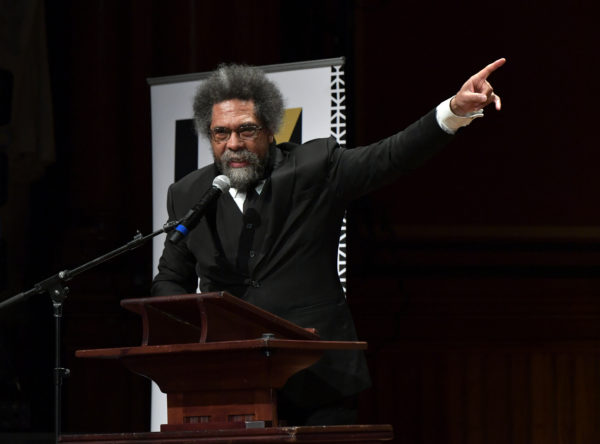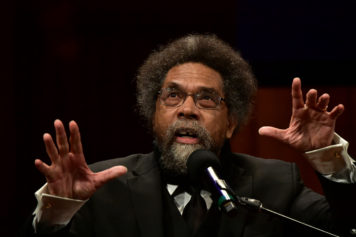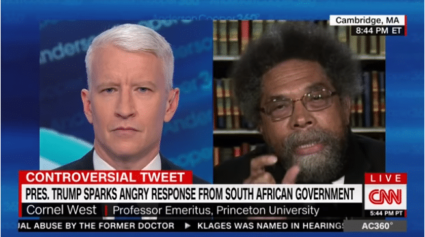Dr. Cornel West, 67, has followed through on his threat to leave Harvard University after the school failed to consider him for tenure. The renowned scholar and activist will return to Union Theological Seminary, where he was first hired at age 23, and has taught at various times over the years.
“I’ve got to make my move to the great Union Theological Seminary. My perennial home,” West said. “I’m making the move back to New York, and it’s not a move out of default. Not at all. I’m going with a smile. I’m going fired up.” He added on Twitter, “Our struggle for truth & justice continues with style & smiles!“

West, who taught philosophy, Divinity and public policy at Harvard, has left the university before. He first departed the prestigious Ivy League institution in 2002, after a dispute with then president Lawrence Summers over his external activities, including making hip-hop music and advising civil rights leaders like Rev. Al Sharpton.
He returned in 2017 to a non-tenured position and is lauded by much of the faculty and students as a great asset to the university. It’s why, despite being offered a 10-year contract, pay raise and endowed chairmanship, West told the Boston Globe he was “just not putting up with being disrespected” by Harvard.
In an interview published Feb. 18, West said the school refused his request for tenure, despite a positive five-year review. “It’s sad you have to go through this again, but I wasn’t raised to put up with being disrespected or tolerate disrespect. I don’t try to negotiate respect,” West added.
The intellectual giant — who is a supporter of the Palestinian cause, self-described advocate of oppressed people around the world and frequent broacher of “taboo” subjects — said he was told Harvard thought him “too risky,” “too fraught” and “too controversial.” He also said he believed his age might be a factor.
“Now, it is true that I’ve always felt there are certain taboo issues at Harvard. And we got to hit taboo issues across the board. One of them is the Palestinian cause, wrestling with a serious moral spiritual political critique of the Israeli occupation,” West told The Boycott Times. “We’ve got to be as on fire, as if there was a Palestinian occupation of precious Jewish brothers and sisters, as there is an ugly Israeli occupation of precious Palestinian brothers and sisters.”
It is a stance West has reiterated numerous times in the weeks since traditional and social media erupted with disbelief that Harvard wouldn’t grant a professor of West’s caliber tenure review.
“Is Harvard a place for a free Black man like myself whose Christian faith & witness put equal value on Palestinian & Jewish babies- like all babies- & reject all occupations as immoral,” West wrote on Twitter Feb. 19. “After being tenured at Yale, Harvard, Princeton & Union Theological Seminary, the recent Harvard denial of a tenure process strikes me as a political decision I reject. Nothing stands in the way of my profound love for & solidarity with oppressed peoples wherever they are!!”
Union Theological Seminary’s president Rev. Dr. Serene Jones sees Harvard’s loss as its institution’s great gain. She expressed her excitement at West’s return in an interview with The New York Times, saying West shared the school’s values.
“Our whole school is devoted to the same prophetic message” as West, Jones said, adding he “lives and breathes the values that Union aims to instill in all of the future leaders, scholars, ministers, and activists we educate.”
Jones also said tenure at Union wasn’t even a question for West. “If you could give three times, four times tenure, he would come with quadruple tenure,” Jones said. “His esteemed legacy of engaging the most pressing problems facing our world — including racism, poverty, sexism, and so much more — is an inspiration to all, and illustrates the power of faith to create profound change.”
Many at Harvard tried stood in solidarity with West, including hundreds of doctoral students who balked at the school’s decision and organized to support his tenure bid.
“We say that it is almost difficult to believe Harvard’s dismissal of West’s prolific intellectual output because we are keenly aware of how predominantly white institutions disregard the contributions of Black scholars,” a letter of protest signed by Ph.D. candidates said.
The situation has reignited a conversation around lack of diversity and prestigious schools and the difficulty Black and Latino professors have obtaining tenure.
“A lot of Black students at this school are very disappointed and very upset, but also a lot of non-Black students as well,” Harvard senior Meshaal Bannerman told the Times.
Harvard’s Divinity School and African American Studies departments voted to begin the tenure process for West upon news of his threatened departure; but it was too little, too late.
West said while Harvard’s current president, Lawrence Bacow, “actually has some decency,” he finds the way Harvard and many other institutions handle Black scholars as unacceptable.
“More than anything else, there’s a certain disrespect for Black scholars and taboo issues that don’t allow us to have a robust and respectful dialogue,” West said. “And both of those are very much tied to the way in which the university’s become commodified. It’s a money-driven institution, and it’s sad.”


